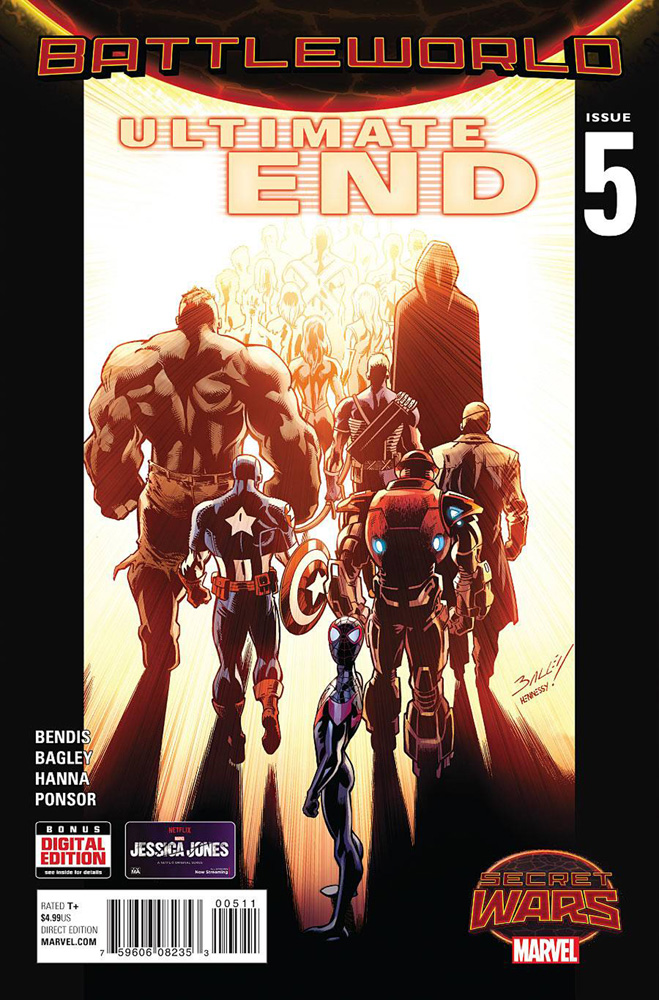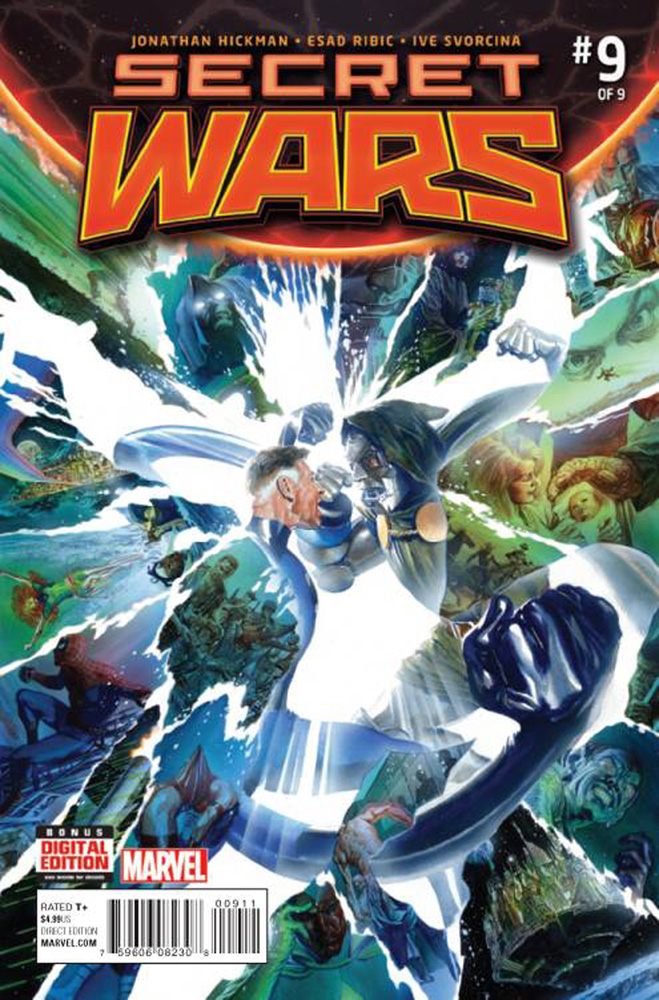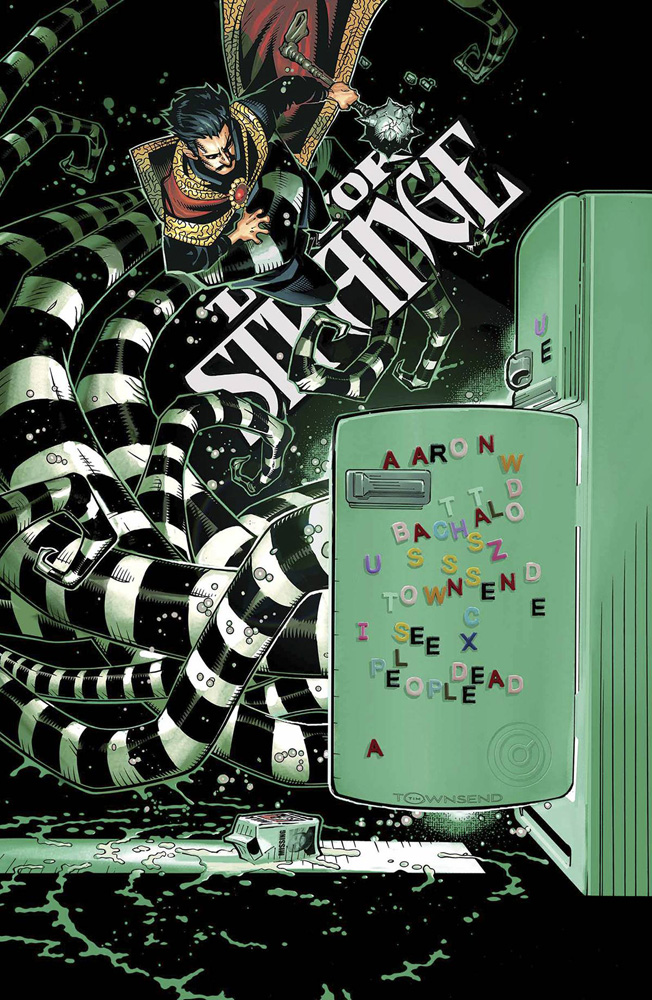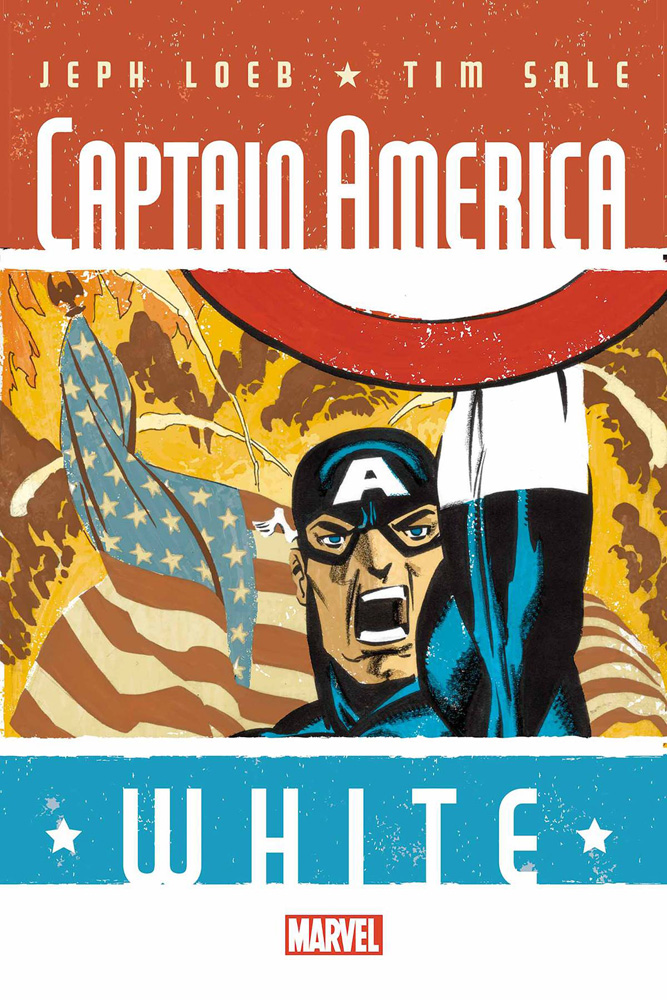Time Keeps on Slipping, Slipping…
a KC Column by KC Carlson
I have to admire Wayne Markley for his recent capsule reviews of most of Marvel’s Secret Wars miniseries (part 1 and part 2) — he powered his way through them and is up-to-date on his reading, while I’m still weeks behind and struggling to finish many of them. With his helpful comments, I can concentrate on the good (or “essential”) comics and, at least for now, bypass the mega-tedious ones.
Wayne also pointed out how late many of the Secret Wars titles are. The entire SW “event” should have been completely wrapped up four weeks ago. That was to make way for the launch of Marvel’s All-New All-Different branding — amazingly, the first time (since 1961) that Marvel has attempted a complete relaunch of their Universe from scratch. (By comparison, DC Comics has relaunched their fictional Universe about as often as you reach for popcorn during your favorite superhero movie.)
As it stands right now, it looks like most of the Secret Wars offshoot miniseries should wrap up soon, with the exception of the handful that tie directly into the conclusion of the main Secret Wars series. Most notably, that includes Ultimate End, which wraps up the fate of Marvel’s 15-year-long Ultimate Universe branding — although I’m sure that nobody who’s been paying attention will be surprised if a character or two from that imprint will (ahem) ultimately survive the upcoming carnage. (Sorry… I just can’t help myself sometimes…)
So, while the tie-ins will supposedly wrap up soon, the main Secret Wars title is still running so late it will be a small miracle if we see it before Christmas. A lot of folks think it’s likely we won’t see the final issue until January or February of next year. And frankly, that’s kind of unacceptable in this day and age.
Retailer Brian Hibbs offered up his view on the lateness in his most recent Tilting at Windmills column. (It’s at the end of the column, so if you’re not interested in Kickstarters, scroll down the page until you see links to “Secret Wars” and “All-New, All-Different” Marvel.) There, you’ll see how retailers have had to scramble to compensate for SW’s lateness and the seeming reader apathy caused by it (at least in his stores). According to Hibbs, the 2011 DC Comics New 52 relaunch was much more successful (at least initially) at the time than the All-New, All-Different Marvel has been, and he blames the lateness of the Secret Wars event for it. (He’s also quick to point out that the New 52 excitement didn’t last very long, and DC has abandoned that branding just over three years later.)
Hibbs goes on to state that his sales started dropping on Secret Wars as soon as delays started affecting the ship dates of the core series and the many and various tie-ins. That lack of momentum on the late Secret Wars books looks to be carrying over to the All-New, All-Different titles. This is not a good thing. For anybody. Especially since many of the All-New, All-Different titles are actually great reads. My fave so far is the new Doctor Strange title. If you loved Jason Aaron’s quirky Wolverine and the X-Men, you’ll love Doc Strange — especially with the weirdly gorgeous artwork by Chris Bachalo!
It’s often tough when balancing artistic impulses, creative work, brand management, and publishing forecasts to keep to a pre-planned schedule. The comics industry has long struggled with how to keep a book on time. Secret Wars is just the latest in a long line of high-profile projects to have embarrassing delays. This one just seems to have more peripheral damage than most.
Lateness happens. Reasons why.
As much as everyone pre-plans, has good intentions of getting an early start, and setting aside vacations, getaways, and other distractions, it’s inevitable that unplanned accidents or tragedies (or sometimes just life) happen to prevent things getting done on schedule. Sometimes publishers themselves gum up the works by agreeing to a schedule, and then some “suit” who couldn’t be bothered to attend the planning meetings walks in at the last minute to say, “Sorry. This needs to be finished three months earlier than originally planned to make budget this quarter. That won’t be a problem, will it?”
Good editors work hard to “idiot proof” their projects. They’d prefer to have Mark “Six-pages-a-day” Chainedtoboard pencilling the book with Byron “Speedy” Fabfingers typing the entire 12-issue series (and dialoguing the first two issues) in a week. But wait! Marketing wants Joe Shineyteeth drawing (because he has the longest lines at ComicCon) and Jimmyjackjoebob Jingleheimerschmidt writing (because he’s an Internet sensation who also plays poker with Hollywood producers!). Congratulations, Editor-lady! Your project is now going to take up over two years of your time, instead of the six months you anticipated. And no one is going to even buy the last three issues — assuming that they’re ever published at all. But the publisher doesn’t care! The movie rights have already been sold!
One of the key conflicts for most comic book editors comes in trying to circumvent lateness by carefully pre-planning the creative team. Unfortunately, few editors get to make those choices completely on their own. Comic book publishers (and their marketing/publicity departments) would rather that everything they publish be “created” by so-called “superstar” artists and writers, because that’s where the big money is.
Similarly, comic book editors usually have impossible workloads (often due to their own success, ironically). In a perfect world, they would hire artists and writers that can consistently produce work on a regular schedule (either weekly or monthly). The reality actually falls somewhere in the middle. Plus, the more popular creators become, the more demands on their time, and it takes a lot of experience and skill to know how much to say yes to.
For most freelancers in the comic book field, there exists a “strike when the iron is hot” mentality. It takes a long time to get noticed at all, and even when they finally land that first regular/ongoing assignment, there is a feeling among many that they still need to be looking for more work. It’s often a good instinct, as most long-time comics watchers know (especially in current times), it’s generally rare that a new ongoing series will stay alive past its 12th issue, unless it stars a bat or a mutant or an Avenger — and even those are not guaranteed anymore.
When you freelance, you can’t just draw or write the comic. You have to be planning the next job, even when the current job is going well. So, there is a certain mentality among many creators that you always have to be looking for work, because so little in comics is a sure thing.
Unfortunately, this is exactly the mentality that leads to creators risking “overbooking” — taking on too many assignments at the same time without knowing how they’re going to hit all those deadlines. Both new and “hot” talents can find themselves in this situation, and how they manage (or not) is an indicator of how their career is probably going to go on a long-term basis, at least in terms of how they’re perceived by industry editors and publishers. And I haven’t even mentioned the lure of mixing and schmoozing at conventions, which take additional time away from work.
I don’t know any sure-fire solutions to this problem. As long as we expect artists to create 20+ pages a month, month in and month out, there will be crises and emergencies and struggles and burnout. But overall, I think a big help would be honesty. Creators should maintain honest communication with their editors, and companies should be as honest as possible in their schedules.
__________________________________
KC CARLSON once (with another DC Editor) had to confront a talented penciller who was drawing a monthly title for each of us. The reason we had to confront him was we both read in CBG that this same artist was soon to start drawing a third title for an indy publisher. Now, the artist in question was fast — but not three books a month fast! So we called him in for a meeting, and both of us point-blank asked him which one of our books he was going to drop to take on this new assignment. He hemmed and hawed a lot (obviously not expecting to be confronted like this), and ultimately it was my book he decided to drop. I had no hard feelings about it, since an editor previous to me had hired him for the job, so he had no real loyalty to me, nor me to him. The parting was amicable. And because we did this, it also gave me ample time to find a new artist, and time for that artist to get started working ahead.
If only all editor/freelancer relationships could go as well as this…
Special thanks this time around to both WM & JDC.
WESTFIELD COMICS is not responsible for the stupid things that KC says. Especially that thing that really irritated you. Still patiently waiting for Ambush Bug: Year None #6… Hey, Captain America: White eventually showed up (unexpectedly…)






USER COMMENTS
We'd love to hear from you, feel free to add to the discussion!